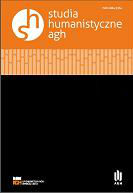GEORG BRANDES AND THE MODERN PROJECT
GEORG BRANDES AND THE MODERN PROJECT
Author(s): Jørgen VeislandSubject(s): Cultural Essay, Political Essay, Societal Essay
Published by: Wydawnictwa AGH
Keywords: the modern project; freedom and emancipation; naturalism; literature as social criticism; Europe in Denmark
Summary/Abstract: Georg Brandes’ lecture series on The Main Tendencies in 19th Century Literature was initiated in 1871 and consists of a number of innovative interpretations of European literature. Brandes’ interpretations exemplify his interest in the ideals of the Enlightenment: knowledge, liberation, progress and free thought. The lecture series traces a dialectical movement in European literature, described by Brandes as a dialectics between revolution and liberalism on one hand and conservatism and reactionary tendencies on the other. Brandes includes a dialectics between home, i.e. Danishness, and the ‘foreign’; he opens up a dialogue between nationalism and internationalism with the intention of almost literally placing Europe in Denmark and vice versa. The future was going to be realized in the present. Georg Brandes tried to persuade the young writers of Scandinavia to adopt liberalism and naturalism in their novels and dramas, which some of them proceeded to do, convinced as they were that Brandes’ ideas regarding a new ‘debate’, moral and political, in literature, were right. However, they failed to implement these ideas as we can see by a reading of, for example, Jens Peter Jacobsen’s Niels Lyhne (1880); Henrik Ibsen’s Rosmersholm (1886) and Henrik Pontoppidan’s Lykke-Per (1898–1904). Emanicipating the mind and liberating oneself from the reactionary forces of society turned out to be too diffi cult for the women and men of what Brandes himself referred to as The Modern Breakthrough. Looking at Brandes today we may conclude that he was ahead of his own time as well as ahead of ours. His ideas regarding a new internationalism and liberalism are far from being realized.
Journal: Studia Humanistyczne AGH
- Issue Year: 10/2011
- Issue No: 1
- Page Range: 75-86
- Page Count: 12
- Language: English

